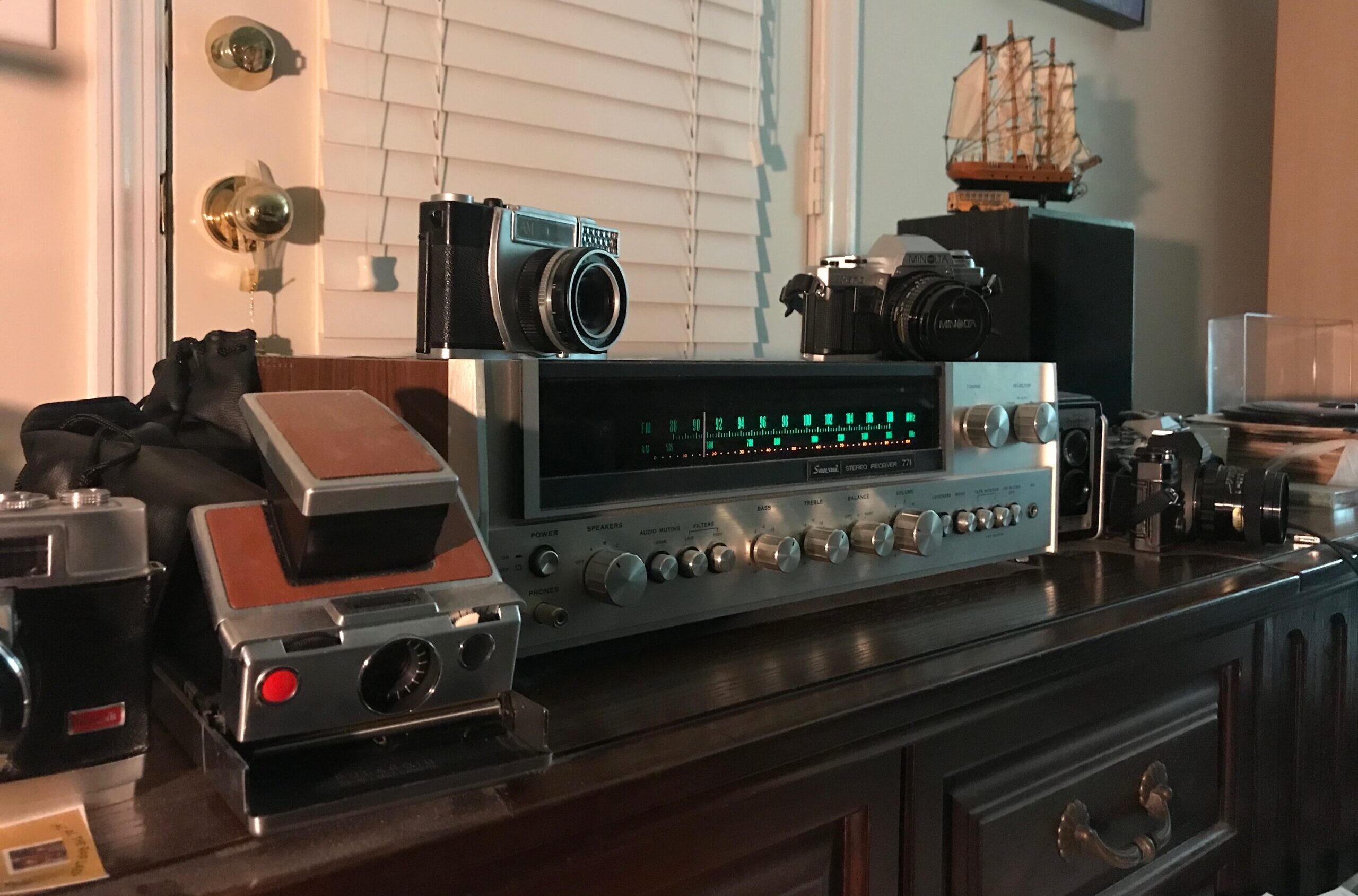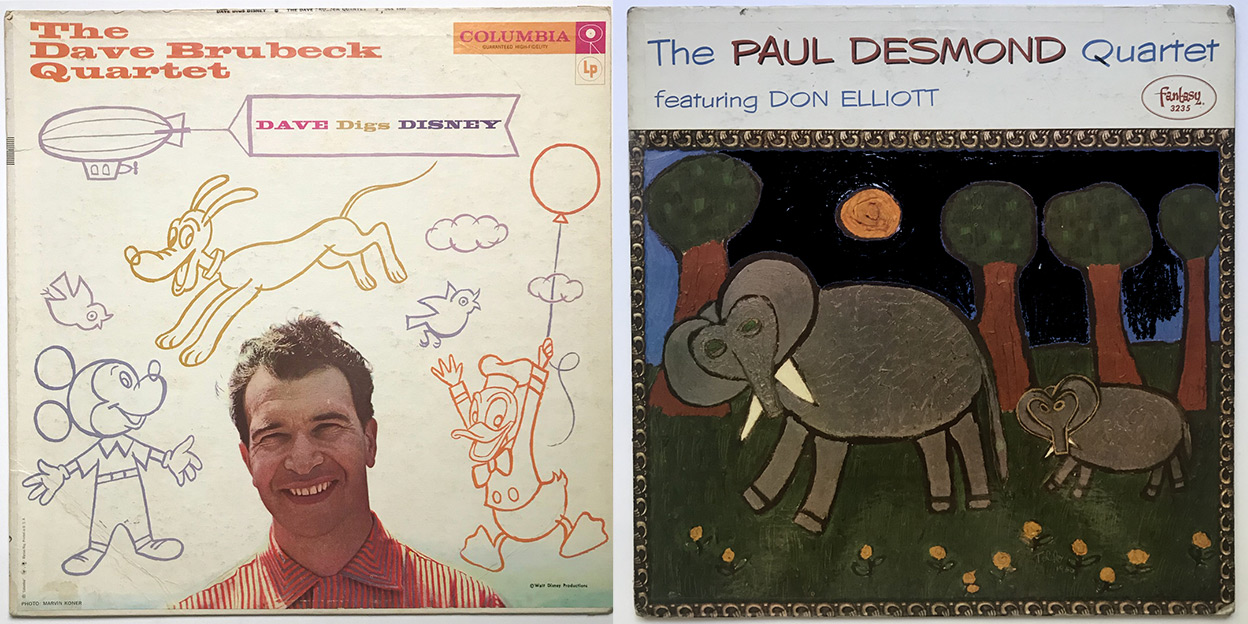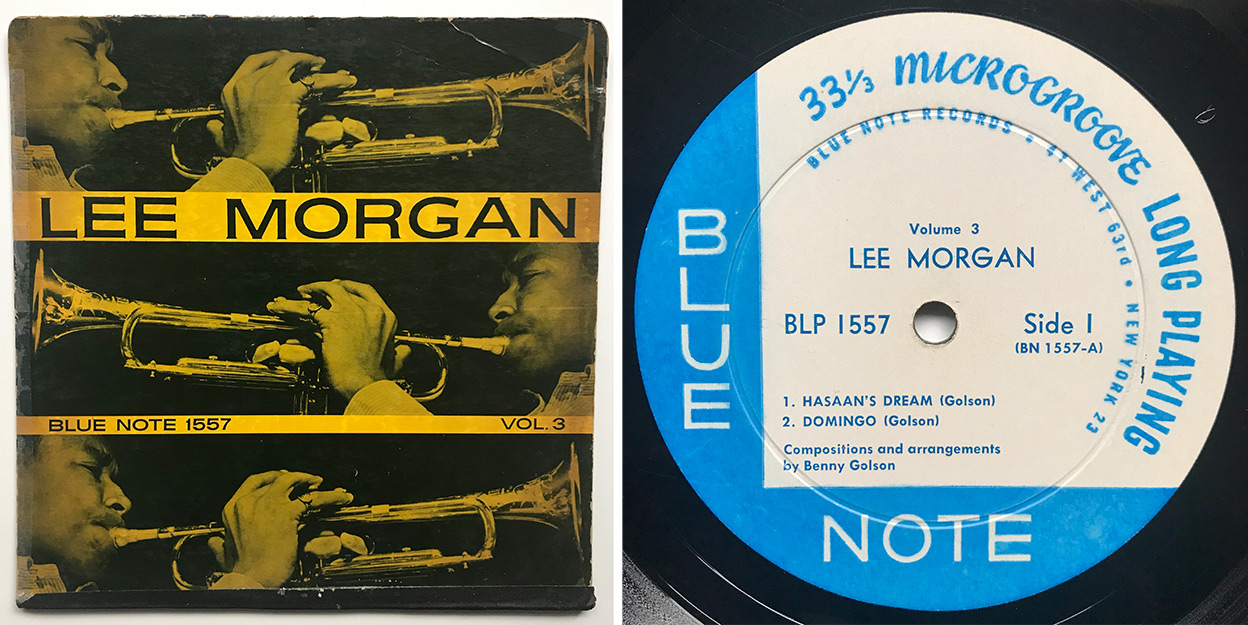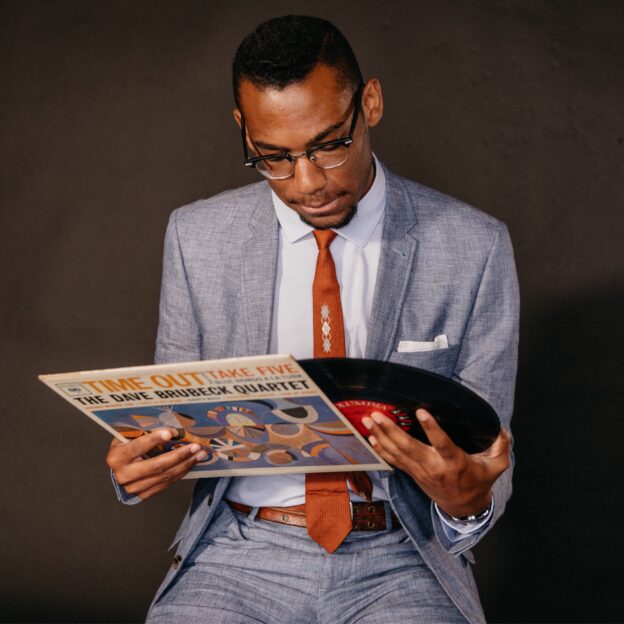 |
If vintage jazz record collecting were a contest where collectors set out to prove just how much the act of collecting really is “about the music” and not about the object, Tarik a.k.a. @araggywaltz wins, by a long shot. I’m sure many of us could admit that collecting feels slightly competitive at times (what doesn’t in today’s world), and though this is surely not the main reason why we participate in our hobby, I have found that most collectors will readily admit that if collecting really were all about the music, all they’d have to show for it would be a hard drive full of digital music files. But Tarik is a rare type of vintage jazz collector, and as you will see in the answers below, his favorite artists are almost universally “uncollectible” by those who have a tendency to equate musical and monetary value.
To break the ice here, I’ll admit: I have done this. When I first got into vintage jazz collecting I definitely made a conscious decision to sidestep a lot of the artists Tarik loves for the simple fact that their records weren’t as rare or in demand. And just as there’s nothing wrong with getting more excited about finding a Hank Mobley original than a Herbie Mann, surely there’s loads of quality music out there that’s readily available and also not causing feeding frenzies on eBay. If you don’t believe me, check out Tarik’s blog, It’s a Raggy Waltz, where you can get all the education you need on the “un-hip”. And I recommend everyone partake in this exercise. At the very least, it will serve to demonstrate that collecting doesn’t have to be so much about the object or the hype.
I’ll let Tarik say the rest…take it away!
DGM: How long have you been collecting records and jazz records specifically?
Tarik: I’m a relative newcomer to the wide world of record collecting compared to most record collectors, and jazz record collectors specifically. I walked into a record store and bought something for the first time when I was in high school. One of my best friends was getting into vinyl, and his enthusiasm for it plus the hipness factor of owning vinyl records piqued my interest. The local record store was a five-minute walk from my high school, so one day I decided to check it out. I walked out with a Clifford Brown reissue. That was in 2011, my senior year of high school. I bought a few more records in 2013, but 2014 is when I really started collecting methodically and in earnest. So, to finally answer your question, technically nine years, but really about five.
DGM: How did you get started collecting jazz records?
Tarik: The event that really planted the record collector seed happened in middle school. The secretary in the school office was playing some wild jazz piano that was different from anything I had heard. Asking her what it was, she told me it was Dave Brubeck. The next day, she gave me a copy of the CD, and I instantly became a HUGE Brubeck/Paul Desmond fanatic. Fast forward to college, at which point I had acquired almost all of Brubeck’s music, now on iTunes. Searching for more Brubeck, I begin to discover that a lot of the rare Brubeck music was available only on vinyl. This led to me trying to find those bootleg albums, and before I knew it, it dawned on me that a lot of jazz hadn’t made the leap from vinyl to digital, or even vinyl to CD! The only way to hear it was to track down the original sources. That and, having grown up on CDs, I missed the artwork and especially the liner notes that told you who was on the album. I began to revisit the local record store and buy online, and the rest (like my money) is history.
 |
| Tarik gazing at a crispy copy of the Brubeck classic |
DGM: How did you amass your collection and what’s your process for finding new records?
Tarik: Early on, I got most of my records from eBay, but the deeper I got into vinyl, I began to tire of eBay. I returned to the brick and mortar stores and that’s where I’ve gotten the vast majority of my records, supplemented by records from friends, my grandpa’s collection, and even my college’s collection. Of course, whenever I travel around the country, I try to seek out the local record store. Some people buy mugs or keychains as souvenirs; I buy records.
As for my process, I don’t know if I’d even call it a process. I almost never set out looking for a specific record. I know what artists I like, so if I stumble upon something that they recorded or recorded on, I’ll check it out. Having said that, I use much more than mere name recognition to find records. I check the record company, song list and length of those songs, etc. If I find something interesting, I’ll look it up online and try and listen to a sample of the music as well as read a review or two of the record in question. At the end of the day, the most important thing to me is buying music that I like. Dassit.
DGM: How many jazz records do you have in your collection?
Tarik: I don’t exactly know! A few summers ago, I attempted to get my collection catalogued. I’m still trying to get that done. Besides jazz, I buy other random things on vinyl like rock, funk, house, and modern stuff like Jeff Goldblum, Bruno Mars. A significant chunk of my vinyl library is classical, and I have a secret love affair with old mood music from the 1950s and ‘60s. All in all, I would say that I have less than 1,000 but definitely more than 500 records, including 10-inch albums and 45s. Probably like 800. Out of that, probably 87% is jazz.
DGM: Do you collect originals, reissues, or both?
Tarik: I buy both. Yes, I try to buy originals when possible, but as a fresh college graduate, I don’t have the money to buy an original Waltz For Debby that (and this is key) actually sounds good. As such, why wouldn’t I buy a modern reissue that’s done well, sounds amazing and is affordable? Sure, I’m aware that some reissues truly aren’t worth getting, but by and large, there’s nothing wrong with them. Of course, what’s a reissue, anyhow? I have many Blue Note albums that are technically reissues since they’re Liberty pressings. In my opinion, they’re basically an original since they’re made from the original tapes, often have Van Gelder’s literal stamp of approval, and look the same as the first pressing. Why pay a gazillion dollars just so you can have some obscure etching in the runout wax when you can get it cheaper as a “reissue”? No offense, but at that point, is it really about the music? As such, my library is proudly peppered with reissues. If at some point in my life I come across the original and I can afford it, sure I’ll upgrade — but only if the sonics match or come SUPER close to that reissue. But until then, at least I have it in physical form to listen to whenever I want, and isn’t that the point of buying music?
DGM: What equipment do you use for playback?
Tarik: My hifi setup isn’t anything crazy as these things go, but I’m extremely proud of it. My turntable is a U-Turn Orbit, and I recently upgraded my cartridge to an Ortofon OM5E. I use a glorious 1974 Sansui 771 stereo receiver, and a pair of Klipsch KG .5 speakers for playback. I bought the receiver and the speakers at my local record store (Vertical House Records!!!) here in Huntsville, Alabama two days into 2018. I love my setup and the sound it produces. For a college student, it was high-end yet extremely affordable and I love the look of the Sansui with all of its knobs, buttons and dials. One of those sums the channels, effectively turning a stereo signal into a mono one. Using this fancy doodad, I can listen to my mono albums in “true” mono despite using a stereo cart.
 |
| Tarik’s listening station, complete with the photographer’s collection of vintage cameras |
DGM: Do you prefer mono, stereo, or neither?
Tarik: Years of listening to terrible old bootlegs and radio broadcasts of Dave Brubeck in mono has trained my ears to not really care what format the music is in. In the words of Paul Desmond, “the music could be recorded on cellophane as long as I can hear what the musicians are up to.” Now, having said that, I made the mistake of buying one of those Blue Note fake stereo 1500 series records, and it’s predictably terrible. Early in stereo’s life, it could either be really good or really disgusting. Mono, however, is always safe. Generally speaking, I prefer mono during the 1950s and stereo for ‘60s pressings. There are exceptions, though. Columbia sounds glorious regardless if it’s stereo or mono (in fact, two of the crispest, most delicious-sounding albums I own are 1960s Columbia mono pressings!), and Contemporary was making fantastic stereo albums at the very beginning.
DGM: Who are some of your favorite artists and labels?
Tarik: Paul Desmond. Paul Desmond is my absolute favorite jazz musician of all time, and it’s not even close. His logic, taste, humor, wit, flow of ideas, beauty, lyricism…I could just listen to him all day and all night and then all day the next day. Naturally, then, Dave Brubeck is my second favorite jazz musician and another that I could listen to all day long. Maybe it’s because he plays the piano in such an intensely personal way, or because, like Desmond, you can hear him actively thinking and surprising both the audience and himself. To me, that’s the epitome of jazz and what makes it my favorite genre of music — the risk taking and raw emotion. Some other favorite artists of mine include the severely underrated and severely under-discussed vibist and percussionist Cal Tjader (clean, laid-back, and cool), organist Shirley Scott (economical, dynamic-filled, and punchy), pianist Billy Taylor (all of these qualities plus clunky glasses like mine), and Horace Silver (absolutely phenomenal compositional prowess).
As for labels, the West Coast indie label Fantasy holds a special place in my heart. The whimsical, highly unprofessional, scattershot and cavalier manner in which it was run makes for an extremely frustrating yet rather fun record label. Sure, you may not know when or where the music was recorded, but who needs trivial facts like that?
DGM: What’s your favorite jazz record in your collection?
Tarik: Usually this question inspires a lot of hemming and hawing about how one can never have a favorite record, blah blah blah. Maybe I’m the weird one, but I know exactly what my answer is. My favorite records in my collection are my copies of Paul Desmond’s Fantasy album The Paul Desmond Quartet featuring Don Elliot and Dave Brubeck’s album for Columbia entitled Dave Digs Disney, simply because both are my favorite jazz albums. I could go on for days about why these albums are my favorite, but I’ll instead just say that both albums swing, are full of wit and logic, and above all else, are FUN!
 |
| Tarik’s favorite albums, hands down |
DGM: What is one of your most memorable acquisition stories?
Tarik: The greatest acquisition story in my record-buying career was actually extremely underwhelming in that I had no idea of the treasure I had until weeks later. Walking into my local record store a few days into 2018, I stumbled upon a few Blue Note albums, all seemingly well-worn. One was Lee Morgan Volume Three (Blue Note 1557). The cover looked rough, and the vinyl looked just the same. I’d never heard of the album, but the list of supporting personnel plus the price of $20 made it easy to take a chance. Buying it and some hi-fi equipment (this is when I bought my Sansui receiver and speakers, too), the record store owner gave me a discount as a New Year’s gift, so I actually paid about $15 for it. I went home and played it on my new system and I was blown away by how crisp and gorgeous it sounded. There were skips in two places, but it otherwise sounded fantastic. I didn’t realize the magnitude of it all until a vinyl collector friend absolutely flipped out when I casually mentioned it to him. I say it means the least to me because I was merely buying an album I was unfamiliar with by a musician that I loved. I had no idea that it was so rare, coveted, and expensive!
 |
| Tarik’s copy of Lee Morgan Volume 3 |
DGM: How do you feel about eBay’s influence on the collecting experience?
Tarik: To be frank, I hate it. It’s inflated prices of jazz vinyl to crazy levels, all because some rich folk are willing to drop some serious coin on auctions. Do these guys and gals actually listen to their $3,000 records? It makes it hard for regular folks like myself who like Sonny Clark but will never be able to own an original record of his because of the alleged “value” of the record, real or otherwise. The sellers are also to blame. I mean, I love Brubeck to death, but there’s no reason at all why a USED record of the most popular (and thus most ubiquitous) jazz combo of the 1950s should cost $50!
DGM: What are your thoughts on the past, present, and future of the jazz record market?
Tarik: From what I’ve seen and experienced, I would say that we’re living in a weird and difficult time for record collecting in general and jazz record collecting in particular. After much ado about the great vinyl comeback from the vinyl community, vinyl has almost become mainstream again. Hip commercials have trendy rich young people playing records on record players, and Target of all places is selling fancy vinyl in-store. It’s hip to buy records. Maybe not collect them hardcore to the point that it’s a lifestyle and personality trait like many of us, but capitalism doesn’t care where on the spectrum buyers of vinyl may land. All of this new-found activity has caused vinyl prices to go up. New people getting into the game that may not know the difference between a deep groove and a microgroove but know that John Coltrane is cool get phased out. It’s great in the short term for sellers, but it can’t sustain like this forever. The remedy? I’m not sure.
DGM: Do you have any advice for other collectors?
Tarik: If you haven’t been able to tell from my responses and thoughts espoused so far, I approach jazz record collecting from a very different perspective. I’m a young guy (I hate the term ‘millennial’) fresh out of college yet I’ve been listening to jazz for basically my entire life. The thing that makes me even more different though is that I’m black. Yep. The guy that lists white musicians and their albums as favorites is an American Negro. I’ve been called a record collecting unicorn! Because of my admittedly unorthodox listening and collecting habits, the best piece of advice I can give anyone is this: Just do you. That’s my record collecting philosophy. I don’t collect for any other reason than I like music and I want it in physical form. Don’t try to collect Blue Note first pressings just because you’ve been told that that’s what ‘serious’ collectors do, and don’t neglect certain jazz artists & labels because of the opinions of ‘serious’ collectors. Just. Do. You. By collecting strictly what I like because I dig it, my library feels more personal and an accurate reflection of who I am. If you’re basing your musical choices on anything other than your ears, you’re missing the point. Buying music on iTunes or CD wasn’t this complicated. Neither should vinyl collecting. March to the beat of your own [ear] drum!

